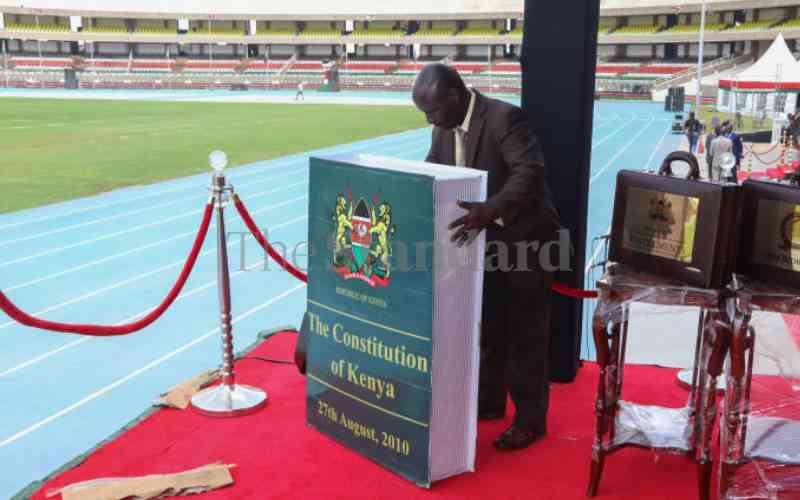NAIROBI: A controversy is raging between the County Government of Kisumu and Mr Francis Mutie, the Regional Commissioner. The issue is simple. Mr Mutie is of the opinion that Prosperity House, the skyscraper used previously as the Provincial Headquarters for Nyanza Province, belongs to his office: the Regional Commission. Governor Jack Ranguma and his deputy Ruth Odinga aver to the contrary: the County Headquarters is the legal successor of institutions of government in Kisumu that existed under the previous constitution, and Mr Mutie had better be acquainted with clause 33 in the Sixth Schedule of the Constitution on “Transitional and Consequential Provisions.” In this regard Mr Kinuthia Wamwangi, the boss of the Transitional Authority, has thrown his weight behind the Governor. So have I as the County Senator. What do we then do with brother Mutie?
First we must regard Mutie’s salvo as an unfortunate incident. The County Government has been in Prosperity House for close to three years of its five year existence. It is therefore rather late in the day to regard that occupation as a mistake. If it were, the matter should have been raised expeditiously when it originally came to light. And if it is raised now it should be settled between the Office of the President and the Transition Authority in Nairobi.
Second, it is provided in Clause 17 of the Sixth Schedule quoted above that “within five years after the effective date, the national government shall restructure the system of administration commonly known as the provincial administration to accord with and respect the system of devolved government established under this Constitution.” If I am not wrong, the end of the five year period is just around the corner. Governor Ranguma is right: what now exists as Regional Commissions are mere administrative exigencies in the Office of the President: they are in no way constitutional offices. The President’s Office has the right to establish any office to facilitate its work. But given the Constitutional provision that the former provincial administration should be “restructured to conform to devolution”, it would be a gross travesty to establish new “provincial-like” offices in competition with devolved government rather than eliminating them to strengthen devolution. Hence the more legitimate claimant of Prosperity House is the head of devolved government rather than the head of a dying provincial government system.
Third, in “the Transition to Devolved Government Act” (No. 1 of 2012), a Transition Authority was established to “ facilitate and co-ordinate the transition to the devolved system of government as provided under section 15 of the Sixth Schedule to the Constitution.”
Among the facilitative functions of the Authority was to “provide mechanisms for the transfer of assets which may include vetting the transfer of assets during the transitional period” (Article 7.2.g). Mr Mutie, being an interested party in the transfer of Prosperity House, should have put his case before Mr Wamwangi rather than issue an order, ex cathedra, for Governor Ranguma to quit Prosperity House. Rules of natural justice require that one cannot be a judge in her or his own cause.
Fourth, I believe the Regional Commissioner currently occupies the former PC’s office situated not too far away from the State House in Kisumu. This is as it should be. This particular office is reminiscent of days gone: encapsulating the relics of colonialism and its successor, the authoritarian regimes of yesteryear. To be quite frank, that PC’s office must be retained as a historical monument in Kisumu. In its architecture and wooden structure, it is definitely a sight to behold. While the office of the Regional Commission lasts,
Mr Mutie should be proud that he is actually making history. His name will go down as one of the last relic of a provincial administration system that once denied Kenyans self-governance at the grassroots level. In fact, facilities should be availed for Mr Mutie to record his daily experiences, including the current controversy that is trying to rewind the clock of history on his part.
I for one love that old building. In the context of a rather hot climate around the lake shore, a wooden structure makes a lot of sense. All the meetings I had in the past with the previous occupants of that building left me with pleasant memories.
Not that the occupants were always pleasant but that the air was always cool and fresh. When therefore the relics of the provincial administration are finally done away with, that building should be preserved as it is and used by the county government for holding high level meetings with visiting delegations. It will, of course, need some renovation without changing its essential character. And that is the beauty of that building. It is capable of being restructured to be in line with the spirit of devolution.
Finally, a passing shot to our county government. It is critical that these first five years be used to put in place a sound assets register that will ensure the people of Kisumu do not lose their heritage to marauding accumulators who are always out to defraud the people and their government. This requires establishment of proper institutions, most of which are spelt out in the Constitution as well as the County Government Act, which will take care of these assets. The delay in establishing such institutions and giving them requisite powers may cost the County dearly in the long run.
Establishing a City Management Board for Kisumu City is long overdue. The level of awareness of Kenyans now compels those in authority to be vigilant about accountability: and Kisumu is no exception.
Such a board will help plan the city, ensure local level governance improves sanitation in neighborhoods, improve revenue collection and encourage a positive investment climate for both local and foreign business ventures. Kisumu enjoys a comparative advantage as a potential entertainment city and a leader in the hospitality industry. The gap between the current achievement and the potential for the future remains enormous. This is an area in which good governance will play an important role. It is therefore important that the agenda for action is not set by such issues as those raised by Mr Mutie. There is more useful work to be done; let it get done. As the famous saying goes, what gets done gets measured.
 The Standard Group Plc is a
multi-media organization with investments in media platforms spanning newspaper
print operations, television, radio broadcasting, digital and online services. The
Standard Group is recognized as a leading multi-media house in Kenya with a key
influence in matters of national and international interest.
The Standard Group Plc is a
multi-media organization with investments in media platforms spanning newspaper
print operations, television, radio broadcasting, digital and online services. The
Standard Group is recognized as a leading multi-media house in Kenya with a key
influence in matters of national and international interest.
 The Standard Group Plc is a
multi-media organization with investments in media platforms spanning newspaper
print operations, television, radio broadcasting, digital and online services. The
Standard Group is recognized as a leading multi-media house in Kenya with a key
influence in matters of national and international interest.
The Standard Group Plc is a
multi-media organization with investments in media platforms spanning newspaper
print operations, television, radio broadcasting, digital and online services. The
Standard Group is recognized as a leading multi-media house in Kenya with a key
influence in matters of national and international interest.








